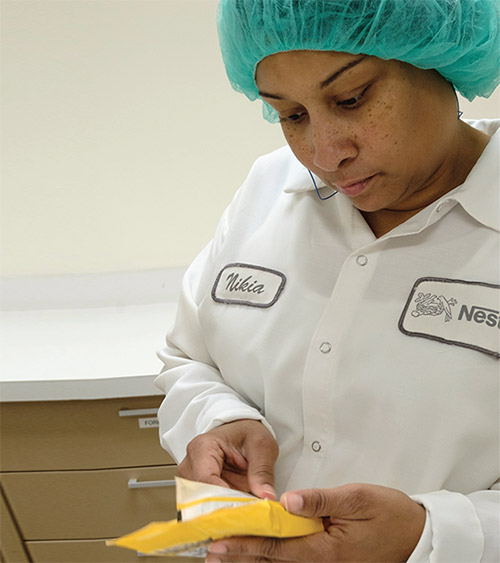Nestlé: A Flexible Manufacturing Landscape
Nestlé USA is a subsidiary of Nestlé S.A., a leading global nutrition, health and wellness company. Nestlé USA operates 79 manufacturing facilities and employs 48,000 people in the U.S. Nestlé USA operates two Virginia manufacturing facilities in Danville and King William, and moved its headquarters to Arlington in 2017.
Q4 2019

Virginia Economic Review: As you look at Nestlé, what do you see as major trends from a manufacturing perspective in the U.S. over the next five to 10 years or so? How are things changing?
Bill Cooper: The first thing is that the way people shop certainly has changed in many sectors. We have typically built our manufacturing to be in full truckload quantities to distribution centers to retail channels. We believe, over time, that’s going to change and require us to be much more custom than we’ve been used to. We see the manufacturing landscape needing to be more flexible with how we package and deliver products in the future.
VER: Do you see automation and the internet being big factors as well?
Cooper: Yes, technology is certainly exploding. Digital is the term we use that encompasses a lot. You’ll hear things like connected worker, connected line, connected factories. The ability to use information, to gather information, and put it in the hands of people in the factory who can make best use of it in real time is a direction that we, and most of the industry, are striving toward.
VER: What can states and regions do to better position themselves to retain and support existing manufacturers and attract new manufacturing investment in the future?
Cooper: As we continue to go down the technology path, having an available workforce, or the ability to train the workforces we have, will be critical. That’s everything from skilled tradesmen able to work on equipment to the workforce skilled to use and exist with this technology going forward. The future is that operators and mechanics will have handheld computers giving them data and information. What I think states or regions can continue to do is really drive those types of programs, both education programs and training programs for existing workers.
VER: What do you think makes Virginia a compelling place for manufacturing?
Cooper: Virginia has been progressive in trying to offer an environment that’s good for companies to be in. Environment encompasses a lot of things, from available workspace to the right kind of tax environment. But it’s also about being a place where companies can get the right people, the right training, the right equipment, the right facilities. Certainly, what we’ve found in Virginia’s been very positive for us from that standpoint.
Virginia is certainly near population centers. As we continue to drive initiatives to be closer to our consumers, there’s a large population base here on the Eastern Seaboard. Virginia is well-located to serve both north and south in population areas that are growing today.
VER: We hear a lot about the skills gap in the U.S., which, I think, is considered particularly acute in manufacturing. Do you have a sense of what’s driving that gap and what states could do to close it?
Cooper: I think what’s driving the gap is that in policy and society, going to a trade school or learning specific trades skills, whether that be around automation, or controls, or basic electrical and mechanical, that’s fallen just a bit out of favor for young people in the U.S. There just aren’t that many people aspiring to or able to get that kind of training. That’s what’s really created the gap.
It really has almost become a cultural thing where we’re just not getting people growing up and thinking that’s a career path they want to choose. The reality is that there really are good jobs out there with good pay and good benefits. But it’s almost a numbers game now. We don’t have enough coming into the funnel to service the industry and the businesses that need it.
Project Announcements
Oldcastle APG Plans Lancaster, South Carolina, Operations
05/10/2025
Vantive Plans Deerfield, Illinois, Headquarters Operations
05/10/2025
SkyWest Airlines Plans Shreveport, Louisiana, Maintenance Operations
05/10/2025
Hissho Sushi Plans Rock Hill, South Carolina, Headquarters-Distribution Operations
05/09/2025
Nelson Brothers Expands Walker County, Alabama, Operations
05/04/2025
Kimberly-Clark Expands Aiken County, South Carolina, Distribution Operations
05/04/2025
Most Read
-
Run a Job Task Analysis
Q4 2024
-
39th Annual Corporate & 21st Annual Consultants Surveys: What Business Leaders and Consultants Are Saying About Site Selection
Q1 2025
-
The Location Economics of Advanced Nuclear
Q1 2025
-
Why Workforce Readiness Can’t Wait
Q1 2025
-
Power, Policy, and Site Selection in 2025
Q1 2025
-
Is It Time to Start Planning for Quantum Data Centers?
Q1 2025
-
Top States for Doing Business in 2024: A Continued Legacy of Excellence
Q3 2024